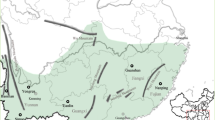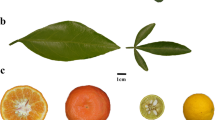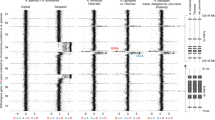Abstract
THE diploid, 2n = 18, seems to be a physiologically optimum condition in the genus Citrus. In many species the polyploids are known to arise spontaneously from seeds. But there are comparatively few instances of vigorous and economically useful polyploids in this genus. It is really interesting that such a large genus, having numerous species, should generally have the same chromosome numbers. With this idea in view, cytogenetical studies were undertaken to investigate the cytological basis of speciation in this genus.
This is a preview of subscription content, access via your institution
Access options
Subscribe to this journal
Receive 51 print issues and online access
$199.00 per year
only $3.90 per issue
Buy this article
- Purchase on Springer Link
- Instant access to full article PDF
Prices may be subject to local taxes which are calculated during checkout
Similar content being viewed by others
References
Naithani, S. P., and Raghuvanshi, S. S., Naturwiss. (in the press).
Tanaka, T., J. Ind. Bot. Soc., 16 (4), 36 (1937).
Stern, H., J. Hered., 37, 46 (1946).
Author information
Authors and Affiliations
Rights and permissions
About this article
Cite this article
NAITHANI, S., RAGHUVANSHI, S. Cytogenetical Studies in the Genus Citrus . Nature 181, 1406–1407 (1958). https://doi.org/10.1038/1811406b0
Issue Date:
DOI: https://doi.org/10.1038/1811406b0
This article is cited by
-
Genome-wide association study and transcriptome of olecranon-type traits in peach (Prunus persica L.) germplasm
BMC Genomics (2021)
-
Cytoevolutionary patterns inRutaceae
Plant Systematics and Evolution (1993)
-
Cytogenetical studies inCitrus. Part I
Genetica (1963)
Comments
By submitting a comment you agree to abide by our Terms and Community Guidelines. If you find something abusive or that does not comply with our terms or guidelines please flag it as inappropriate.



